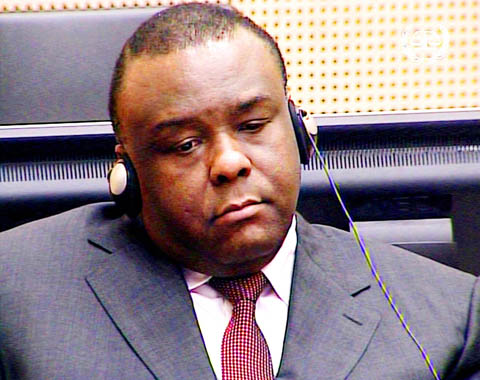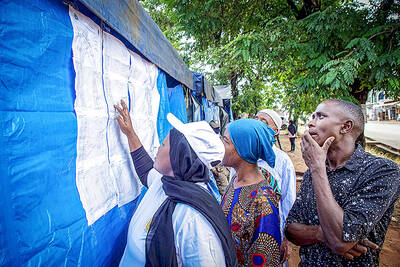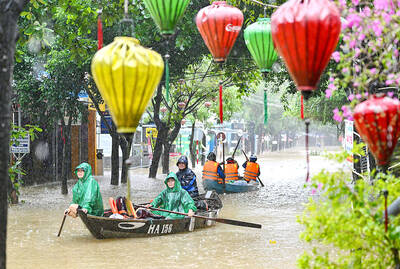When Jean-Pierre Bemba, a rich and powerful Congolese politician, visited his family in Brussels in late May, he had no inkling that he would be grabbed by the Belgian police, thrown in jail and put before an international tribunal.
His arrest warrant had been kept secret by the International Criminal Court (ICC) in The Hague.
On Friday, Bemba, a former vice president and still a sitting senator in Congo, made his first appearance in court. Bemba, once a rebel leader, has been accused of war crimes and crimes against humanity during a 2002 to 2003 campaign by his forces fighting to Congo’s north in the Central African Republic.

PHOTO: AFP
Bemba, who lost Congo’s pivotal presidential election in 2006, is the most senior suspect now in the custody of the court, which holds three other Congolese suspects accused of large-scale human rights violations.
The prosecution is expected to focus on sexual violence, charging that Bemba’s fighters gang-raped women of all ages in public places, infecting many of them with HIV, the virus that causes AIDS.
Prosecutors contend that the fighters also tortured and pillaged, leaving victims dead, wounded or traumatized. Human rights groups have long said that Bemba’s militiamen were aiding the Central African Republic’s president at the time, Ange-Felix Patasse, whose forces terrorized civilians in retribution for a coup attempt.
During the short hearing on Friday, Bemba was not asked to enter a plea, but he has denied the charges. He waved to his wife in the court’s public gallery and was asked by the court only to confirm his identity and the conditions of his detention.
“The conditions are not the best, not what I had hoped for,” said Bemba, who gave his occupation as “senator.”
Bemba, 45, is a scion of a prominent Congolese family with a large business empire. He is still an important opposition figure with a considerable following, even though before being arrested he had spent the past year in Portugal. He had fled Congo amid clashes between his forces and the government.
At home, his angry supporters have denounced the court in The Hague. In Brussels, Congolese immigrants have protested his arrest on the streets, wearing T-shirts adorned with Bemba’s photograph.
This week the office of the prosecutor, Luis Moreno-Ocampo, had a serious setback in another case linked to Congo.
On Wednesday, judges ordered the release of another Congolese warlord, Thomas Lubanga, just as his trial was about to begin. It was to have been the first trial since the permanent criminal court was created in 2002.
Judges ruled that mishandling of the evidence by the prosecutor’s office meant that Lubanga could not receive a fair trial. The prosecution has appealed the decision, and Lubanga will have to stay in the court’s prison in The Hague while the appeal is considered.
The Lubanga episode has prompted surprise and discomfort in the large legal community of this city. It also cast a shadow over this week’s marking of the 10th anniversary of the Rome Statute, which created the court.

With much pomp and circumstance, Cairo is today to inaugurate the long-awaited Grand Egyptian Museum (GEM), widely presented as the crowning jewel on authorities’ efforts to overhaul the country’s vital tourism industry. With a panoramic view of the Giza pyramids plateau, the museum houses thousands of artifacts spanning more than 5,000 years of Egyptian antiquity at a whopping cost of more than US$1 billion. More than two decades in the making, the ultra-modern museum anticipates 5 million visitors annually, with never-before-seen relics on display. In the run-up to the grand opening, Egyptian media and official statements have hailed the “historic moment,” describing the

‘CHILD PORNOGRAPHY’: The doll on Shein’s Web site measure about 80cm in height, and it was holding a teddy bear in a photo published by a daily newspaper France’s anti-fraud unit on Saturday said it had reported Asian e-commerce giant Shein (希音) for selling what it described as “sex dolls with a childlike appearance.” The French Directorate General for Competition, Consumer Affairs and Fraud Control (DGCCRF) said in a statement that the “description and categorization” of the items on Shein’s Web site “make it difficult to doubt the child pornography nature of the content.” Shortly after the statement, Shein announced that the dolls in question had been withdrawn from its platform and that it had launched an internal inquiry. On its Web site, Le Parisien daily published a

UNCERTAIN TOLLS: Images on social media showed small protests that escalated, with reports of police shooting live rounds as polling stations were targeted Tanzania yesterday was on lockdown with a communications blackout, a day after elections turned into violent chaos with unconfirmed reports of many dead. Tanzanian President Samia Suluhu Hassan had sought to solidify her position and silence criticism within her party in the virtually uncontested polls, with the main challengers either jailed or disqualified. In the run-up, rights groups condemned a “wave of terror” in the east African nation, which has seen a string of high-profile abductions that ramped up in the final days. A heavy security presence on Wednesday failed to deter hundreds protesting in economic hub Dar es Salaam and elsewhere, some

Flooding in Vietnam has killed at least 10 people this week as the water level of a major river near tourist landmarks reached a 60-year high, authorities said yesterday. Vietnam’s coastal provinces, home to UNESCO world heritage site Hoi An ancient town, have been pummeled by heavy rain since the weekend, with a record of up to 1.7m falling over 24 hours. At least 10 people have been killed, while eight others are missing, the Vietnamese Ministry of Natural Resources and Environment said. More than 128,000 houses in five central provinces have been inundated, with water 3m deep in some areas. People waded through